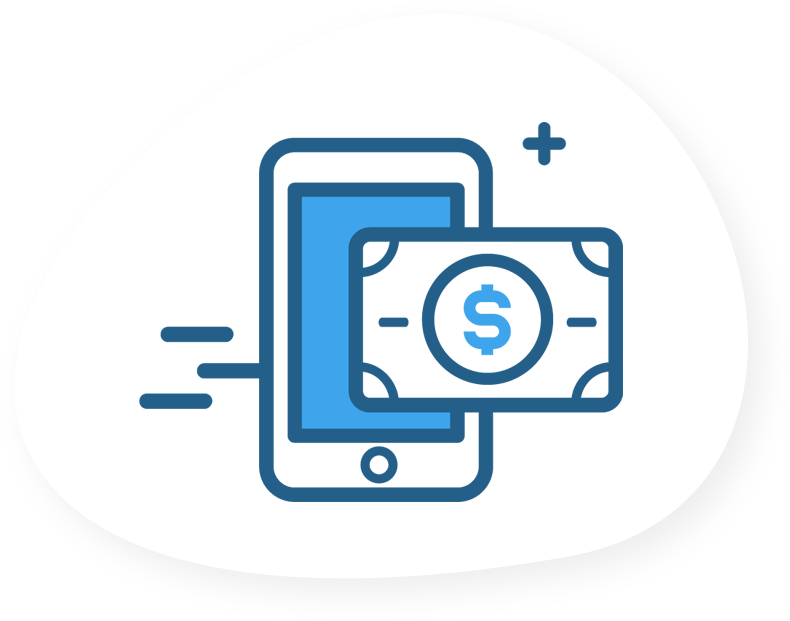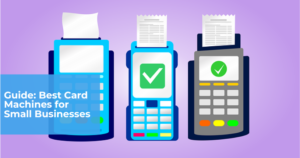If you run your own business you will need to take credit card payments from customers, and applying for a card reader or merchant account services can be a stressful task. Banks check your business and personal credit rating, and may find some nasty surprises in your history that you didn’t even know about like failed mortgage or credit card payments. If they don’t like what they see, they will prevent you from using merchant services with them and from getting a credit card reader.
Worse yet, even if your credit history checks out, they still have a massive list of reasons why they could decline you from taking customer card payments with a card reader.
Index:
What is a merchant account?
We’ll start with the basics: what, exactly, is a merchant account? In short, it’s an account that lets you take credit cards—and that’s it. It doesn’t really have another purpose. You’ll open a merchant account with your bank or an aggregator, agree to abide by their rules, and pay them the necessary fees.
It’s separate from your current account, and might not even be held by the same bank that you do most of your banking with. Only certain banks offer merchant accounts, like WorldPay, Barclaycard, Streamline, and Independent Merchant Services.
In short, the point of a merchant account is to be able to take credit card payments. By opening an account with a credit-acquiring bank, the merchant account enables you, the business owner, to verify credit card details and accept payments.
Personal and business bank accounts aren’t equipped to do this, which is why your mates can’t pay you with a credit card when they owe you petrol money (though that’s changing).
The fact that the merchant account allows you to take these payments is why they cost money. You usually pay a monthly tariff, a percentage of each payment, and various fees for other things, including renting a credit card terminal that allows you to take payments.
You can’t open a merchant account with just any bank—it needs to be a credit-acquiring bank, like Elavon, Valitor, RBS Streamline, Barclay’s Merchant Services, CardSave, or Lloyd’s Cardnet.
What does it cost to open a merchant account?
This can vary a lot, depending on your bank. For example, Barclaycard charges anywhere between £0 and £25 per month, depending on exactly how you accept card payments (learn more about card payment hidden costs!). There are also transaction fees that range from 1.25% to 2.6% + 20p. There can also be different fees for accepting debit cards.
As you can imagine, this can add up quickly, especially if you have to pay for a card terminal as well, which can cost anywhere from £25 to upwards of £60.
Figuring out the cost of a merchant account is notoriously difficult. Many of the providers of merchant accounts make it very difficult to find out how much you’ll pay for their accounts without actually getting in touch with the company.
After doing some digging, however, it’s clear that you could be paying a lot of money. There are setup fees that range from £50 to £500, just to get your account up and running. There are monthly charges from £15 to £50, and annual fees of up to £200.
Not only that, but you’ll also be charged a terminal rental fee, which you can assume will probably be around £20 per month. So, assuming a £100 setup fee (which is quite low), £20 in monthly fees, and £20 for a terminal, you’re looking at almost £600 in the first year!
Many merchant accounts also require that you sign a contract, stating that you’ll stay with that bank for the next 12 or 18 months—this often comes with a guarantee of a lower transaction rate for the period. And if you cancel during that contract, you could be paying over £100 in cancellation fees.
And don’t forget transaction fees; these are on top of the setup, monthly, and rental fees, and come directly from customer payments.
Remember that all of this is in addition to your business bank account.
What else do I need to open a merchant account?
In addition to paying for it, you’ll need a business bank account, even if you’re the sole employee of the company; you’ll need to be a registered business; and you may need to go through an underwriting process (or sometimes more than one). You might also need to open multiple merchant accounts if you’re taking payments through multiple different methods, like online, over the phone, or in person.
In addition to that, you’ll likely need to present a business plan, a written business summary, a profit and loss projection, and (if you’re doing business online) a website with sufficient terms and conditions.
Is a merchant account the same as a business bank account?
No—a business bank account is just a current account for your business; it lets you deposit and withdraw money, write and accept checks, and get a business debit card. In contrast, a merchant account isn’t for storing money; it’s just for accepting payments (which are then deposited into your business bank account).
Business bank accounts can be expensive on their own—for example, an account from Santander will cost between £7.50 and £20 per month, and a business account from Lloyd’s can cost up to £40 monthly!

In addition to the monthly tariffs, you’ll also pay a number of fees, depending on which bank you use. These range from fees for paperwork (£10 for a copy of your statement at Santander) to fees for debit card transactions (40p at Lloyd’s) and even to fees for depositing cash (0.6%–1% at HSBC).
These tariffs and fees can add up over months and years, especially if you’re doing multiple sorts of transactions on a daily basis.
What other option do I have?
Opening a merchant account can be a huge headache, especially if you’re trying to open one quickly—which might not happen. But what else can you do? If you want to accept credit and debit cards, you’ll need a merchant account . . . unless you accept them with SimplyPayMe!
We don’t require a merchant account, there’s no monthly fee, and we have some of the lowest transaction fees in the business. We even make it super easy to transfer the transaction fees to your customer, letting you essentially pay 0% on your transactions.
And if you don’t have to go through all of that hassle, why would you?
Will a merchant account help my business?
Insofar as it allows you to take credit cards, yes. When it comes to actually running your business efficiently, no.

Merchant accounts just let you take credit cards—they won’t help you with quotes, invoicing, receipts, expense tracking, or the other things you need to do to keep your business running. That’s all still up to you (though keep reading to find out how SimplyPayMe can help you with this).
Is it easy to get a merchant account?
Getting a merchant account isn’t quite as simple as getting a personal or business bank account. According to ukbusinessforums.co.uk, you’ll need a registered company, a business bank account, a business plan, a written business summary, management accounts, profit and loss projections, a website (if you’re going to do business via one), terms and conditions, picture identification, and paperwork from any contractors.
That’s a lot of paperwork! Especially if you’re just getting started. And if you can’t produce everything satisfactorily, your application will be rejected, and you’ll have to start over.
And if you’re an immigrant to the UK, getting a merchant account can be even more difficult. Providers of merchant accounts can be overly cautious when they’re processing applications, and even legally documented, trustworthy immigrants who have reputable businesses can have difficulty getting approved.
Do I need a merchant account?
Now that you’ve seen how expensive it can be to get a merchant account, you might be wondering if you need one.
The short answer is no, you don’t need a merchant account. While merchant accounts used to be a necessity for any business that wanted to take credit card payments, SimplyPayMe is making it easy to accept credit and debit card payments without a merchant account.
Doing business without a merchant account
Want to run a business without being gouged by acquiring banks?
You can use SimplyPayMe to take card payments that will be deposited directly into your bank account. No need to go through the long application process, pay the exorbitant fees, or rent a terminal. Sound too good to be true? It’s not—it’s just a great new mobile payment app for the iPhone.
SimplyPayMe provides everything you need, and nothing you don’t. You get the ability to take credit and debit card payments while you’re on the go without renting a terminal. Just zap your customer’s card with your iPhone, and the payment will start processing.
And where a merchant account just lets you take payments, SimplyPayMe lets you do a lot more—you can send quotes, manage bookings, create customised receipts and invoices, and even download all of your transactions to easily upload into your accountancy software.
And don’t forget that there’s no extra hardware that you’ll need for SimplyPayMe —you don’t need to pay a terminal rental fee or pay up front for an iPhone credit card reader like you do with other mobile payment providers. That’s cash in your pocket from the start.
Lack of documentation: Banks will ask for a whole host of information about you and your company “including details of the merchant’s legal name, their DBA (Doing business as) name, their URL, and their contact details including email, address and telephone number. The most standard requirements for accompanying documentation include driving license, passport, proof of incorporation or business license, monthly processing statements, and monthly bank statements. If your company already has an online presence, then this entails further paperwork, including a BBB (Better Business Bureau) report for your DBA, Legal Name and URL, printed yahoo.com search results for your DBA, Legal Name, and URL, a printed list of your domains from whois.webhosting.info, as well as print-outs from your website showing product descriptions and merchant policy.*” This means if you fail to provide any of these following details the bank will have a right to decline your application. (Source)
You don’t process enough per month: This is a killer for small businesses, if you don’t process at least a certain amount per month (usually £1000+). You might be deemed too small to take on. Similarly, if you process a below average amount for the industry that you are in you may also be rejected. For example if the average turnover for a company in your industry is £20,000 a month and you only do £5,000 a month, this could be another factor that blocks you from taking card payments and ultimately inhibiting your business’s growth.
You are deemed a “high risk” – Banks have a list of industries which they will reject because of their high risk nature. This includes industries that have a high level of chargebacks, refunds, fraud or high level of fatal accidents like mining or agriculture. Banks decide who they want to accept so can reject you purely on their interpretation of your business’s risk level.
ALSO: You will be asked to set up a business account with a bank if you want to take card payments and may also be asked to put a cash deposit (which can be over £10,000) to cover chargebacks. Chargebacks are disputed transactions, a reversal of funds requested by the customer from your account back to the customer. The bank has these deposits in place to protect itself from losing money through disputes, and you as the merchant have to pay the price.
Now this sounds pretty awful. Thousands of companies are rejected for merchant accounts every year. Cash flow is vital to a business and not being able to take card payments will seriously hinder your success. If you have bad credit, not enough capital for a large deposit or just keep on getting rejected for a merchant account. What is the solution?
Sign up to a service like SimplyPayMe and be running in minutes. No credit checks, no merchant accounts, no escrow, no deposits, no minimum turnover and you don’t even need a card reader. Just card payments, plain and simple.












